 MyCatBreeds
MyCatBreeds Lykoi is originated from United States but Birman is originated from France. Both Lykoi and Birman are of same weight. Both Lykoi and Birman has same life span. Both Lykoi and Birman has same litter size. Both Lykoi and Birman requires Moderate maintenance.
Lykoi is originated from United States but Birman is originated from France. Both Lykoi and Birman are of same weight. Both Lykoi and Birman has same life span. Both Lykoi and Birman has same litter size. Both Lykoi and Birman requires Moderate maintenance.
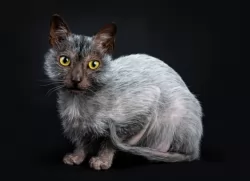 These cats were first discovered in 2010 in Virginia. It was Patti Thomas who named the breed Lykoi.
These cats were first discovered in 2010 in Virginia. It was Patti Thomas who named the breed Lykoi.
It was in 2012 that the cat breed went before the International Cat Association and is now recognized as a Championship Breed.
There is also work being done to expand the cat’s breeding program. It’s a naturally occurring gene in the feral cat population. There are still Lykoi cats born to the feral cat population.
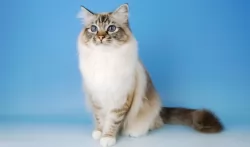 There isn’t clarity as to this exquisite cat’s origins. Many people believe they originated as the companions of temple priests in northern Burma.
There isn’t clarity as to this exquisite cat’s origins. Many people believe they originated as the companions of temple priests in northern Burma.
The cats somehow found their way to France, and it is believed that they have been in France since the 1920s.
The cats nearly disappeared during World War II, but luckily the remaining Birmans that survived were crossed with Siamese and Persians to strengthen the breed. In the early 1950s, pure Birnam litters were produced. It was in about 1959 that Birmans were brought to the United States.
The cats were also recognized in Britain in 1965 and in 1966 by the CFA. The first Birman cats were seal point but later other colors were brought in such as red, chocolate, and tabby.
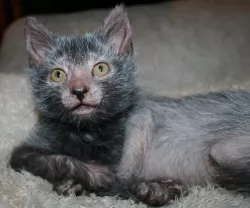 The Lykoi varies quite a bit in looks and you get some that are completely covered in hair and some that are actually partially hairless. Strangely, they are born with quite a lot of black fur.
The Lykoi varies quite a bit in looks and you get some that are completely covered in hair and some that are actually partially hairless. Strangely, they are born with quite a lot of black fur.
The cat has a solid black roan coat with no undercoat. Even though the cat is partially hairless, it molts a couple of times each year.
People are inclined to think that the little bit of hair would be wiry, when in fact it is soft and silky. It's just that it looks like bristles, but is actually not. People are always surprised by the coat's softness.
The Lykoi has a lean muscular body with large ears and eyes. He is a medium-sized cat and can weigh between 4 to 6kg.
The Lykoi is a friendly, people-oriented cat that is affectionate towards its human owners. This is also a playful cat breed and he is also intelligent and inquisitive.
The Lykoi is fond of his human family and makes a wonderful companion.
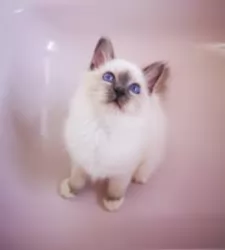 These are medium-sized cats which can become fairly large. They can weigh up to 4, 5 or 6kg. They are fairly heavily boned with a broad face and ears that are widely spaced.
These are medium-sized cats which can become fairly large. They can weigh up to 4, 5 or 6kg. They are fairly heavily boned with a broad face and ears that are widely spaced.
The round eyes are deep blue. The cat’s fur is medium-long and should be silky to the touch with no undercoat. Ther cat is a moderate shedder.
The base color is whitish to cream, but the kittens are always born white. Coat color, whether red, cream, or chocolate is always pointed and the cat always has the white paws.
The Birman isn’t as outgoing as some of the other cat breeds and its a quiet, docile intelligent cat that attaches itself to one particular family member. They can actually become jealous of their human companion and demand their attention.
These friendly cats are wonderful choices for families with children and dogs. They are calm and affectionate, and softly spoken, quietly letting you know when it’s dinner time and enjoying just being around his human family.
He is able to get along well with kids and other pets in the home. He can become quite playful too and because he is so intelligent, you can buy him some toys that require him to think.
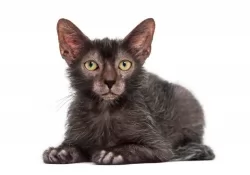 People who have owned the Lykoi say that they make a remarkable and devoted pet. They want a lot of attention and they’re willing to give attention as well.
People who have owned the Lykoi say that they make a remarkable and devoted pet. They want a lot of attention and they’re willing to give attention as well.
They’re social cats and want to spend time with their human companions. A cat that doesn’t receive the love and care it needs can become heartbroken and sick.
If you have one of these cats and your life has changed so that you can’t give it the attention it craves, at least provide it with a feline companion.
Cats aren’t all the aloof creatures they’re made out to be and your Lykoi is capable of making you a splendid companion.
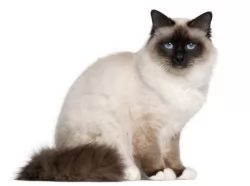 The Birman cat has to be one of the most beautiful cats there are, but the cat isn’t only a beautiful cat, it has wonderful characteristics as well.
The Birman cat has to be one of the most beautiful cats there are, but the cat isn’t only a beautiful cat, it has wonderful characteristics as well.
It is a loving, affectionate cat with his human family, loving to spend time around them. Playful and healthy, when you bring this most wonderful cat into your home, it will be as though an angel has come to stay.
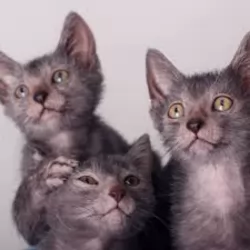 This cat is vulnerable to being cold and it should essentially be an indoor cat. If your Lykoi cat escapes, it can’t possibly keep warm on its own.
This cat is vulnerable to being cold and it should essentially be an indoor cat. If your Lykoi cat escapes, it can’t possibly keep warm on its own.
The Lykoi cat has not shown any specific health problems but being hairless, it is vulnerable to respiratory issues. Eye discharge as well as perpetual sneezing are characteristics of a cat with Feline Upper Respiratory Disease.
The cat’s mouth, sinuses, nasal passages, and upper airway are all affected. Your cat will need to get to the vet for a diagnosis and medical treatment. There are vaccines to prevent feline upper respiratory disease.
Any cat can develop this disease and your cat may have trouble breathing.
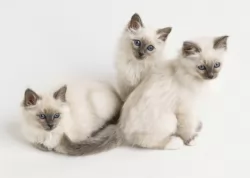 With good health your Birman can reach up to 13 years of age. With the Birman, the most serious illness is feline hypertrophic cardiomyopathy which also happens to be the most common heart disease in cats.
With good health your Birman can reach up to 13 years of age. With the Birman, the most serious illness is feline hypertrophic cardiomyopathy which also happens to be the most common heart disease in cats.
It’s a progressive disease and can result in heart failure. The cats are also at risk of developing feline infectious peritonitis.
Also, because this is a larger cat and a stocky kind of breed, it can easily put on weight and then become overweight. Strict attention will need to be given to diet as well as daily exercise.
Also, look out for Corneal dermoid - skin and hair on the surface of the cornea in one eye or in both. Luckily this is an eye problem that can be surgically corrected.
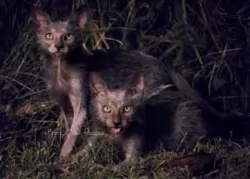 With the Lykoi’s lack of a coat, it isn’t going to require too much grooming. However, you have to keep a watch on this cat as without hair, he is vulnerable to sunburn and to getting cold.
With the Lykoi’s lack of a coat, it isn’t going to require too much grooming. However, you have to keep a watch on this cat as without hair, he is vulnerable to sunburn and to getting cold.
The cat has oily skin and it’s one cat breed that will need a bath occasionally. Some people recommend it once a week. Use warm water and a special pet shampoo recommended by your vet. Every trace of shampoo will need to be washed off to avoid the skin becoming irritated.
Provide your cat with food and water bowls, bedding, litter box, collar, grooming accessories and toys.
Cat food is a huge, important decision for any cat, as their very health depends on it. Commercially manufactured cat foods are available as wet and dry. Make sure you always get your cat food from a reliable source.
Some people believe in offering their cat both wet and dry options. Whatever you decide for your cat, remember that it needs to be at least 70% protein as every cat is a carnivore and requires a diet rich in protein.
If in any doubt, rather speak to your veterinarian and ensure that your Lykoi is getting the best food there is to promote good health. Always make sure that your cat has access to fresh cool water night and day.
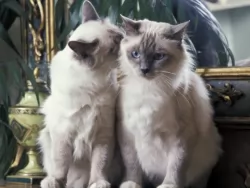 The Birman has a silky coat that sheds moderately so you want to give him a gentle brush once or twice a week to keep the coat of his soft and silky.
The Birman has a silky coat that sheds moderately so you want to give him a gentle brush once or twice a week to keep the coat of his soft and silky.
The Birman has a full topcoat, with no undercoat which means that you won’t have the coat matting or tangling.
He’ll need his nails trimmed and his teeth checked regularly. Your vet or professional groomers can do this for you and clean his teeth and check that there are no bad teeth making your pet sick.
The Birman cat has access to some great commercial cat food as there are some seriously good quality ones.
Many cat lovers choose cat foods that are AAFCO (Association of American Feed Control Officials) approved. It at least provides minimum standards for pet foods.
For your Birman you want to avoid artificial flavors and preservatives. Choose quality foods high in meat protein. As a carnivore, a cat has a huge need for meat protein. Get to know your pet food labels and choose foods with added taurine and vitamin A.